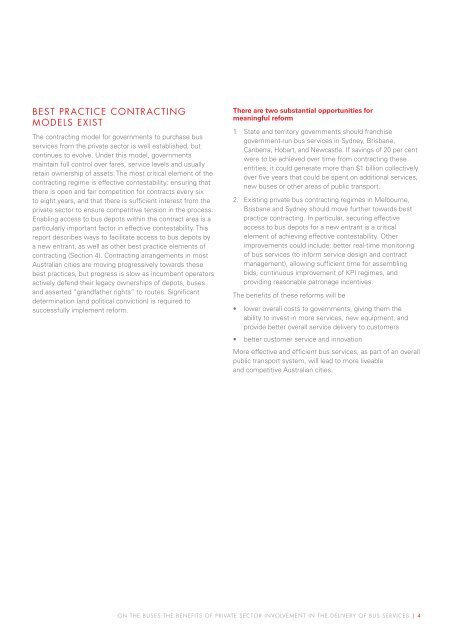ON THE BUSES
TTF-On-The-Buses-Report-2016
TTF-On-The-Buses-Report-2016
Create successful ePaper yourself
Turn your PDF publications into a flip-book with our unique Google optimized e-Paper software.
BEST PRACTICE C<strong>ON</strong>TRACTING<br />
MODELS EXIST<br />
The contracting model for governments to purchase bus<br />
services from the private sector is well established, but<br />
continues to evolve. Under this model, governments<br />
maintain full control over fares, service levels and usually<br />
retain ownership of assets. The most critical element of the<br />
contracting regime is effective contestability: ensuring that<br />
there is open and fair competition for contracts every six<br />
to eight years, and that there is sufficient interest from the<br />
private sector to ensure competitive tension in the process.<br />
Enabling access to bus depots within the contract area is a<br />
particularly important factor in effective contestability. This<br />
report describes ways to facilitate access to bus depots by<br />
a new entrant, as well as other best practice elements of<br />
contracting (Section 4). Contracting arrangements in most<br />
Australian cities are moving progressively towards these<br />
best practices, but progress is slow as incumbent operators<br />
actively defend their legacy ownerships of depots, buses<br />
and asserted “grandfather rights” to routes. Significant<br />
determination (and political conviction) is required to<br />
successfully implement reform.<br />
There are two substantial opportunities for<br />
meaningful reform<br />
1. State and territory governments should franchise<br />
government-run bus services in Sydney, Brisbane,<br />
Canberra, Hobart, and Newcastle. If savings of 20 per cent<br />
were to be achieved over time from contracting these<br />
entities, it could generate more than $1 billion collectively<br />
over five years that could be spent on additional services,<br />
new buses or other areas of public transport.<br />
2. Existing private bus contracting regimes in Melbourne,<br />
Brisbane and Sydney should move further towards best<br />
practice contracting. In particular, securing effective<br />
access to bus depots for a new entrant is a critical<br />
element of achieving effective contestability. Other<br />
improvements could include: better real-time monitoring<br />
of bus services (to inform service design and contract<br />
management), allowing sufficient time for assembling<br />
bids, continuous improvement of KPI regimes, and<br />
providing reasonable patronage incentives.<br />
The benefits of these reforms will be<br />
• lower overall costs to governments, giving them the<br />
ability to invest in more services, new equipment, and<br />
provide better overall service delivery to customers<br />
• better customer service and innovation<br />
More effective and efficient bus services, as part of an overall<br />
public transport system, will lead to more liveable<br />
and competitive Australian cities.<br />
<strong>ON</strong> <strong>THE</strong> <strong>BUSES</strong>:<strong>THE</strong> BENEFITS OF PRIVATE SECTOR INVOLVEMENT IN <strong>THE</strong> DELIVERY OF BUS SERVICES | 4


